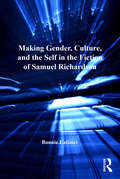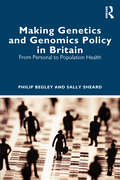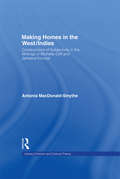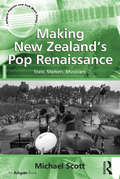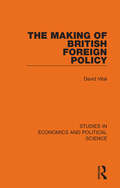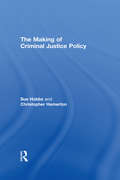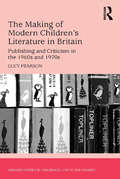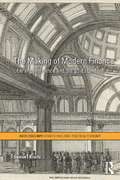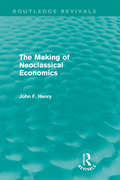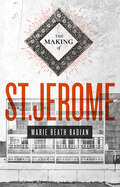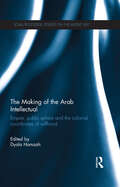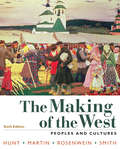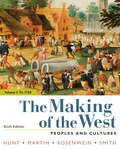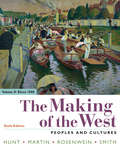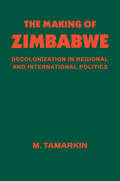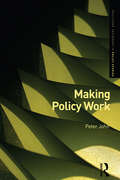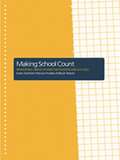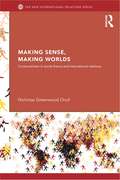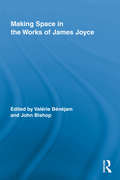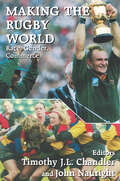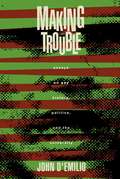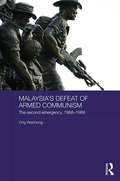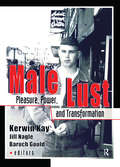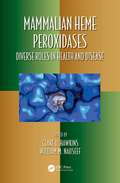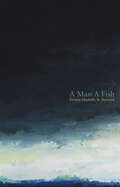Special Collections
Benetech’s Global Certified Accessible Titles
Description: Benetech’s GCA program is the first independent third-party EPUB certification to verify ebook accessibility. By creating content that is born accessible, publishers can meet the needs of all readers. Learn more: https://bornaccessible.benetech.org/
- Table View
- List View
Making Gender, Culture, and the Self in the Fiction of Samuel Richardson
by Bonnie LatimerProposing that Samuel Richardson's novels were crucial for the construction of female individuality in the mid-eighteenth century, Bonnie Latimer shows that Richardson's heroines are uniquely conceived as individuals who embody the agency and self-determination implied by that term. In addition to placing Richardson within the context of his own culture, recouping for contemporary readers the influence of Grandison on later writers, including Maria Edgeworth, Sarah Scott, and Mary Wollstonecraft, is central to her study. Latimer argues that Grandison has been unfairly marginalised in favor of Clarissa and Pamela, and suggests that a rigorous rereading of the novel not only provides a basis for reassessing significant aspects of Richardson's fictional oeuvre, but also has implications for fresh thinking about the eighteenth-century novel. Latimer's study is not a specialist study of Grandison but rather a reconsideration of Richardson's novelistic canon that places Grandison at its centre as Richardson's final word on his re-envisioning of the gendered self.
Making Genetics and Genomics Policy in Britain
by Sally Sheard and Philip BegleyThis important book traces the history of genetics and genomics policy in Britain. Detailing the scientific, political, and economic factors that have informed policy and the development of new health services, the book highlights the particular importance of the field of Public Health Genomics. Although focused primarily on events in Britain, the book reveals a number of globally applicable lessons. The authors explain how and why Public Health Genomics developed and the ways in which genetics and genomics have come to have a central place in many important health debates. Consideration of their ethical, social, and legal implications and ensuring that new services that are equitable, appropriate, and well-targeted will be central to effective health planning and policymaking in future. The book features: Interviews with leading individuals who were intimately involved in the development of genetics and genomics policy and Public Health Genomics. Insights from experts who participated in a pair of 'witness seminars'. Historical analysis exploiting a wide range of primary sources. Written in a clear and accessible style, this book will be of interest to those involved in the research and practice of genetics, genomics, bioethics, and population health, but also to NHS staff, policymakers, politicians, and the public. It will also be valuable supplementary reading for students of the History of Medicine and Health, Public Health, and Biomedical Sciences.
Making Homes in the West/Indies
by Antonia Macdonald-SmytheThis study focuses on the ways in which two of the most prominent Caribbean women writers residing in the United States, Michelle Cliff and Jamaica Kincaid, have made themselves at home within Caribbean poetics, even as their migration to the United States affords them participation and acceptance within its literary space.
Making New Zealand's Pop Renaissance
by Michael ScottSince the early 2000s New Zealand has undergone a pop renaissance. Domestic artists' sales, airplay and concert attendance have all grown dramatically while new avenues for 'kiwi' pop exports emerged. Concurrent with these trends was a new collective sentiment that embraced and celebrated domestic musicians. In Making New Zealand's Pop Renaissance, Michael Scott argues that this revival arose from state policies and shows how the state built market opportunities for popular musicians through public-private partnerships and organizational affinity with existing music industry institutions. New Zealand offers an instructive case for the ways in which 'after neo-liberal' states steer and co-ordinate popular culture into market exchange by incentivizing cultural production. Scott highlights how these music policies were intended to address various economic and social problems. Arriving with the creative industries' discourse and policy making, politicians claimed these expanded popular music supports would facilitate sustainable employment and a sense of national identity. Yet popular music as economic and social policy presents a paradox: the music industry generates commercial failure and thus requires a large unattached pool of potential talent. Considering this feature, Scott analyses how state programs induced an informal economy of proto-pop production aimed at accessing competitive state funding while simultaneously encouraging musicians to adopt entrepreneurial subjectivities. In doing so he argues New Zealand's music policies are a form of social policy that unintentionally deploy hierarchical structures to foster social inclusion amongst growing numbers of creative workers.
The Making of British Foreign Policy
by David VitalHow is foreign policy made? Who makes it? To what conscious and unconscious influences are policy-makers subject? What is distinctive about the immensely complex process as it unfolds in Britain? And what, therefore, is distinctive and characteristic about Britain’s foreign policy today? Who in Britain, has the decisive word? Why is the Foreign Office the king-pin of the system? Why does Parliament count for so little? Does public opinion count at all? Originally published in 1968, these are some of the questions which this book considers in the course of a tightly argued but very readable analysis. Some had been considered on their own elsewhere, but this study represented the first attempt by a contemporary political scientist to pull together, in brief compass, all the relevant threads – including the constitutional, the political, the institutional and the sociological. It is done, moreover, on the basis of a sharp assessment of the type of foreign policy problem that most notably confronted Britain at the time. The author has been successively journalist, official of the Israel Government, and university lecturer in politics. Throughout, his special interests and activities have been in the sphere of international affairs and it was while teaching International Relations at the University of Sussex that he wrote this book. He combines the experience of one who has seen the policy being made from the inside with the theoretical insight of the political scientist; he assesses with a sympathetic but unemotional detachment the constraints on the formation of British foreign policy.
The Making of Criminal Justice Policy
by Sue Hobbs and Christopher HamertonThis new textbook will provide students of criminology with a better understanding of criminal justice policy and, in doing so, offers a framework for analysing the social, economic and political processes that shape its creation. The book adopts a policy-oriented approach to criminal justice, connecting the study of criminology to the wider study of British government, public administration and politics. Throughout the book the focus is on key debates and competing perspectives on how policy decisions are made. Recognising that contemporary criminal justice policymakers operate in a highly politicised, public arena under the gaze of an ever-increasing variety of groups, organisations and individuals who have a stake in a particular policy issue, the book explores how and why these people seek to influence policymaking. It also recognises that criminal policy differs from other areas of public policy, as policy decisions affect the liberty and freedoms of citizens. Throughout, key ideas and debates are linked to wider sociology, criminology and social policy theory. Key features include: a foreword by Tim Newburn, leading criminologist and author of Criminology (2nd Edition, 2013), a critical and informed analysis of the concepts, ideas and institutional practices that shape criminal justice policy making, an exploration of the relationship between criminal justice and wider social policy, a critical analysis of the debate about how and why behaviour becomes defined as requiring a criminal justice solution, a range of case studies, tasks, seminar questions and suggested further readings to keep the student engaged. This text is perfect for students taking modules in criminology; criminal justice; and social and public policy, as well as those taking courses on criminal and administrative law.
The Making of Modern Children's Literature in Britain
by Lucy PearsonLucy Pearson’s lively and engaging book examines British children’s literature during the period widely regarded as a ’second golden age’. Drawing extensively on archival material, Pearson investigates the practical and ideological factors that shaped ideas of ’good’ children’s literature in Britain, with particular attention to children’s book publishing. Pearson begins with a critical overview of the discourse surrounding children’s literature during the 1960s and 1970s, summarizing the main critical debates in the context of the broader social conversation that took place around children and childhood. The contributions of publishing houses, large and small, to changing ideas about children’s literature become apparent as Pearson explores the careers of two enormously influential children’s editors: Kaye Webb of Puffin Books and Aidan Chambers of Topliner Macmillan. Brilliant as an innovator of highly successful marketing strategies, Webb played a key role in defining what were, in her words, ’the best in children’s books’, while Chambers’ work as an editor and critic illustrates the pioneering nature of children's publishing during this period. Pearson shows that social investment was a central factor in the formation of this golden age, and identifies its legacies in the modern publishing industry, both positive and negative.
The Making of Modern Finance
by Samuel KnafoThe Making of Modern Finance is a path-breaking study of the construction of liberal financial governance and demonstrates how complex forms of control by the state profoundly transformed the nature of modern finance. Challenging dominant theoretical conceptions of liberal financial governance in international political economy, this book argues that liberal economic governance is too often perceived as a passive form of governance. It situates the gold standard in relation to practices of monetary governance which preceded it, tracing the evolution of monetary governance from the late middle Ages to show how the 19th century gold standard transformed the way states relate to finance. More specifically, Knafo demonstrates that the institutions of the gold standard helped to put in place instruments of modern monetary policy that are usually associated with central banking and argues that the gold standard was a prelude to Keynesian policies rather than its antithesis. The author reveals that these state interventions played a vital role in the rise of modern financial techniques which emerged in the late 18th and 19th century and served as the foundation for contemporary financial systems. This book will be of strong interest to students and scholars of international political economy, economic history and historical sociology. It will appeal to those interested in monetary and financial history, the modern state, liberal governance, and varieties of capitalism.
The Making of Neoclassical Economics
by John F. HenryFirst published in 1990, this unique explanation of the rise of neoclassical economics views social change as an engine promoting change in theory. It attempts to develop a theory of the origins, consolidation and rise to dominance of the neoclassical school of thought. In so doing, it addresses the contest between the labour and utility theories of value; both are placed in historical context, and reasons are offered for the relative success of each in particular historical periods. It is argued that the eventual dominance of neoclassicism, a theory based on the social changes then taking place, resulted not from its scientific superiority but from its non-social perspective which ignores the social order upon which it depends.
The Making of St. Jerome
by Marie Beath BadianWhen Jason De Jesus discovers his younger brother Jerome was the victim of a senseless shooting, his world is filled with questions surrounding Jerome’s death. Was his brother a threat or a casualty of racial profiling? Was he an innocent bystander or someone other than his family’s shining star? Internalizing his survivor’s guilt while reflecting on their strained relationship, Jason’s quest for truth and justice is tainted as he discovers there are no simple answers.
The Making of the Arab Intellectual
by Dyala HamzahIn the wake of the Ottoman Empire’s nineteenth-century reforms, as guilds waned and new professions emerged, the scholarly ‘estate’ underwent social differentiation. Some found employment in the state’s new institutions as translators, teachers and editors, whilst others resisted civil servant status. Gradually, the scholar morphed into the public writer. Despite his fledgling status, he catered for the public interest all the more so since new professionals such as doctors, engineers and lawyers endorsed this latest social role as an integral part of their own self-image. This dual preoccupation with self-definition and all things public is the central concern of this book. Focusing on the period after the tax-farming scholar took the bow and before the alienated intellectual prevailed on the contemporary Arab cultural scene, it situates the making of the Arab intellectual within the dysfunctional space of competing states’ interests known as the ‘Nahda’. Located between Empire and Colony, the emerging Arab public sphere was a space of over- and under-regulation, hindering accountability and upsetting allegiances. The communities that Arab intellectuals imagined, including the Pan-Islamic, Pan-Arab and socialist sat astride many a polity and never became contained by post-colonial states. Examining a range of canonical and less canonical authors, this interdisciplinary approach to The Making of the Modern Arab Intellectual will be of interest to students and scholars of the Middle East, history, political science, comparative literature and philosophy.
The Making of the West, Combined Volume
by Lynn Hunt and Thomas Martin and Bonnie Smith and Barbara RosenweinThe Making of the West features a chronological narrative that offers a truly global context and tells the story of the cross-cultural exchanges that have shaped western history. This brief book includes a full-color map and art program and comprehensive supplement options. The result is a brief book that is an excellent price and an outstanding value.
The Making of the West, Volume 1
by Lynn Hunt and Thomas Martin and Bonnie Smith and Barbara RosenweinThe Making of the West features a chronological narrative that offers a truly global context and tells the story of the cross-cultural exchanges that have shaped western history. This brief book includes a full-color map and art program and comprehensive supplement options. The result is a brief book that is an excellent price and an outstanding value.
The Making of the West, Volume 2
by Barbara H. Rosenwein and Bonnie G. Smith and Lynn Hunt and Thomas R. MartinWith a superior chronological organization, The Making of the West tells the story of the cross-cultural, global exchanges that have shaped western history. The book offers primary sources in each chapter, a full-color map and art program, and comprehensive supplement options, including LaunchPad and a free companion sourcebook. The Making of the West is an excellent value at an outstanding price.
Available for free when packaged with the print book, the popular digital assignment and assessment options for this text bring skill building and assessment to a more highly effective level. The greatest active learning options come in LaunchPad, which combines an accessible e-book with LearningCurve, an adaptive and automatically graded learning tool that—when assigned—helps ensure students read the book; the complete companion reader with comparative questions that help students build arguments from those sources; and many other study and assessment tools. For instructors who want the easiest and most affordable way to ensure students come to class prepared Achieve Read & Practice pairs LearningCurve, adaptive quizzing and our mobile, accessible Value Edition e-book, in one easy-to-use product.
The Making of Zimbabwe
by M. TamarkinFirst published in 1990. Routledge is an imprint of Taylor & Francis, an informa company.
Making Policy Work
by Peter JohnMany tools are on offer to politicians and other policy-makers when they seek to change policy outcomes. Often they choose to concentrate on one set of tools, but fail to see the costs as well as the benefits – and may not consider the available evidence regarding their effectiveness. This innovative new textbook clearly sets out the main tools of government, and provides an analysis of their efficacy when applied to public problems. Each chapter examines the relative benefits and costs of using a key tool that is available to improve policy outcomes, drawing on a diverse literature, a large number of empirical studies and a range of contexts. Areas covered include: governments and policy outcomes law and regulation public spending and taxation bureaucracy and public management institutions information, persuasion and deliberation networks and governance. Offering a clear and comprehensive evaluation, and highlighting the set of powerful tools commonly available, this text encourages students to consider the most effective combination in order to manage key issues successfully. Including a useful glossary of key terms, this book will be of great interest to all students of public policy, administration and management.
Making School Count
by Andrea Debruin-Parecki and Karen Manheim TeelMaking School Count reports on four years of classroom research in which alternative teaching strategies, designed to motivate under-achieving inner-city, African-American middle school students were used and evaluated. The book offers insights into the discrepancy between students' academic dreams (their high performance aspirations) and the realities of their classroom performance. Issues include: *the authors' convictions that the disproportionate under-achievement of African-American students is the result of inappropriate teaching strategies *the prevalent use of a Eurocentric curriculum *results of the authors' research *a guide for teachers wishing to carry out their own research *a study of the collaboration between a university and a schools in an attempt to bring about change from the ground up.
Making Sense, Making Worlds
by Nicholas OnufNicholas Onuf is a leading scholar in international relations and introduced constructivism to international relations, coining the term constructivism in his book World of Our Making (1989). He was featured as one of twelve scholars featured in Iver B. Neumann and Ole Wæver, eds., The Future of International Relations: Masters in the Making? (1996); and featured in Martin Griffiths, Steven C. Roach and M. Scott Solomon, Fifty Key Thinkers in International Relations, 2nd ed. (2009). This powerful collection of essays clarifies Onuf’s approach to international relations and makes a decisive contribution to the debates in IR concerning theory. It embeds the theoretical project in the wider horizon of how we understand ourselves and the world. Onuf updates earlier themes and his general constructivist approach, and develops some newer lines of research, such as the work on metaphors and the re-grounding in much more Aristotle than before. A complement to the author’s groundbreaking book of 1989, World of Our Making, this tightly argued book draws extensively from philosophy and social theory to advance constructivism in International Relations. Making Sense, Making Worlds will be vital reading for students and scholars of international relations, international relations theory, social theory and law.
Making Space in the Works of James Joyce
by John Bishop and Valérie BénéjamJames Joyce’s preoccupation with space—be it urban, geographic, stellar, geometrical or optical—is a central and idiosyncratic feature of his work. In Making Space in the Works of James Joyce, some of the most esteemed scholars in Joyce studies have come together to evaluate the perception and mental construction of space, as it is evoked through Joyce’s writing. The aim is to bring together several recent trends of literary research and criticism to bear on the notion of space in its most concrete sense. The essays move dialectically out of an immediate focus on the phenomenological and intra-psychic, into broader and wider meditations on the social, urban and collective. As Joyce’s formal experiments appear the response to the difficulty of enunciating truly the experience of lived space, this eventually leads us to textual and linguistic space. The final contribution evokes the space with which Joyce worked daily, that of his manuscripts—or what he called "paperspace." With essays addressing all of Joyce's major works, this volume is a critical contribution to our understanding of modernism, as well as of the relationship between space, language, and literature.
Making the Rugby World
by John Nauright and Timothy J.L. ChandlerThis book explores the expansion of rugby from its imperial and amateur upper-class white male core into other contexts throughout the late nineteenth and twentieth centuries. The development of rugby in the racially divided communities of the setter empire and how this was viewed are explored initially. Then the editors turn to four case studies of rugby's expansion beyond the bounds of the British Empire (France, Italy, Japan and the USA). The role of women in rugby is examined and the subsequent development of women's rugby as one of the fastest growing sports for women in Europe, North America and Australasia in the 1980s and 1990s. The final section analyses the impact of commercialisation, professionalisation and media on rugby and the impact on the historic rugby culture linked to an ethos of amateurism.
Making Trouble
by John D'EmilioFirst Published in 1992. Routledge is an imprint of Taylor & Francis, an informa company.
Malaysia's Defeat of Armed Communism
by Ong WeichongThe Malayan Communist Party’s (MCP) decisive defeat in 1960 led many academics and Counterinsurgency (COIN) experts to overlook the resurrection of its armed struggle in 1968. Most scholars continue to regard the so-called ‘Second Emergency’ in Malaysia (1968-1989) as a non-event, and most of the recently published work on the MCP tends to focus on the earlier Malayan Emergency (1948-1960). This book looks at the Second Emergency through recently released archival material from the National Archives in London, the National Australian Archives and the Australian War Memorial, as well as interviews with military and diplomatic officers from the UK and Thailand. It presents the first serious strategic and operational study of the Second Emergency, and analyses three areas of historical significance: the CPM’s strategy for armed struggle in the Second Emergency; the actual effectiveness of the CPM’s subversive propaganda on its target population and most importantly; the counterinsurgency (COIN) response and strategy of the Malaysian state and to a lesser extent the counter-subversion strategy of Singapore in the post-colonial era.
Male Lust
by Kerwin Brook and Jill Nagle and Baruch GouldMen from a variety of sexual orientations and ethnic backgrounds overturn myths about male sexuality and desire!Male sexuality comes of age in this provocative collection of personal essays and poetry. Male Lust's nearly 60 contributors explore emotional, social, and political aspects of sex and desire from a diversity of backgrounds, perspectives, and sexual orientations. Answering the long-standing challenge for men to finally theorize the complexity of their own sexual desires, Male Lust (a 2001 Lambda Gay Studies Literary Award Finalist) delves into topics such as commercial sex, sadomasochism, feminism, and white supremacy without lapsing into reactionary, knee-jerk or misogynist stances. This book offers a positive sexual vision that moves far beyond the narrow messages offered in mainstream media. Male Lust reveals thoughtful, detailed realities of gay, straight, bisexual, transgender, and same-gender-loving men's personal experiences with sex that lurk behind the stereotypes. Among the many topics that the essays, stories, and poems herein chronicle are: various facets of men's and women's experience with commercial sex, both as consumers and providers social and hormonal phenomena involved in transitioning from female to male handling the impact of white supremacy on male lust as a man of color the transformational possibilities of S/M women's responses to the lusts of the men in their lives coming of age with a “deviant” gender or sexual orientation healing from rape and other forms of sexual abuse coming to terms with loving and desiring women within a misogynist culture lust and desire within a disabled bodyTogether, the contributors break the noisy silence surrounding male lust, challenge the dominant images of men as unemotional sexual predators, and expose the live, beating hearts, minds, and souls of real men loving, healing, and revealing themselves, each other, and the women in their lives. Male Lust heralds the next generation of thinking men--a must-read for anyone seeking cutting-edge ideas on sexuality and desire.
Mammalian Heme Peroxidases
by Clare L. HawkinsMammalian heme peroxidase enzymes play a critical role in innate immune responses and disease prevention. The formation of potent chemical oxidants is essential to this protective physiologic activity in immunity. Although highly beneficial in the context of immune defense, it is now well established that peroxidases and their overproduction of oxidants contribute to the initiation and persistence of many chronic inflammatory conditions in the cardiovascular, neurologic, respiratory, renal, and gastrointestinal systems. Peroxidasins, a protein family related to heme peroxidases, play a novel role in tissue biogenesis and matrix assembly, which are also attracting attention in different pathological contexts. Given the diverse roles of mammalian heme peroxidases and the breadth and incidence of pathologies associated with these enzymes, there has been significant interest in modulating peroxidase activity as a therapeutic strategy. This book highlights recent developments in our understanding of the chemistry, biochemistry and biological roles of mammalian peroxidases and their associated oxidants, their involvement in both innate immunity and chronic inflammatory disease in a variety of end organs, and potential therapeutic approaches to modulate and prevent damaging reactions. Key Features Structure and biosynthesis of mammalian peroxidases Reactivity of hypohalous acids with biological substrates Peroxidases in innate immunity Peroxidases in human pathology Modulation of peroxidase-induced biological damage
A Man A Fish
by Donna Michelle St. BernardProsper is a fisherman trying to get by in the face of everyday problems: there’s the spectre of the baby his wife desires, the ghost of his dead mistress, his wife’s secret admirer, and the overwhelming lure of the village bar. When a slippery eel salesman arrives in town peddling progress to the rural community, Prosper’s list of problems only increases. Faced with an invasive new species in his lake, his fortunes decline along with the fish population, and Prosper gets a lesson in gift horses and generosity. A Man A Fish is a part of the 54ology, inspired by events in Burundi.
